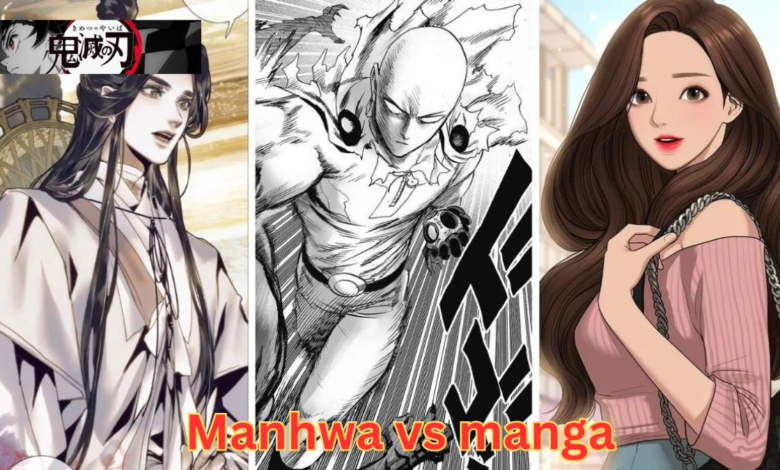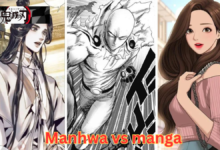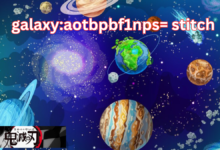Manhwa vs Manga: Unpacking the Differences Between Korean and Japanese Comics

Introduction to Manhwa vs manga
In the vibrant world of comics, two distinct styles reign supreme: Manhwa vs manga. While both offer rich narratives and captivating characters, they originate from different cultures—Korea and Japan, respectively. As their popularity soars globally, fans often find themselves asking: what sets these two art forms apart? This exploration goes beyond mere illustrations; it delves into history, storytelling techniques, artistic flair, and cultural influences that shape each genre uniquely. Join us as we unpack the differences between Manhwa vs manga versus manga and discover what makes each one special in its own right!
Historical Background of Manhwa vs manga
Manhwa vs manga have intriguing histories rooted in their respective cultures. Manga traces its origins back to the 12th century in Japan, evolving through various art forms, including ukiyo-e woodblock prints. By the late 19th century, modern manga began taking shape, thanks largely to influential artists like Rakuten Kitazawa.
In contrast, Manhwa vs manga later in Korea during the early 20th century. It gained momentum after World War II when social changes spurred a demand for new storytelling formats. The Korean War further influenced this growth as artists sought ways to express their experiences.
Both comics were shaped by regional influences and societal shifts. Yet today, they share a vibrant global presence that transcends borders and language barriers. Each has evolved under unique circumstances but continues to draw inspiration from its rich heritage.
Art Styles and Characteristics of Manhwa vs manga
Manhwa vs manga showcase distinct art styles that mirror their cultural origins. Manhwa often features characters with elongated bodies, vivid hair colors, and intricate clothing designs. These elements contribute to a more realistic portrayal of emotions through facial expressions.
In contrast, manga tends toward exaggerated features like large eyes and defined chins. This style enhances the dramatic effect in storytelling. The use of black-and-white ink gives manga its signature look while allowing for detailed shading and dynamic panel layouts.
The reading direction also differs; Manhwa vs manga is typically read left to right, aligning with Western formats. Manga retains a traditional right-to-left format that emphasizes its Japanese roots.

Both forms have unique characteristics that influence how readers engage with the stories they tell. Whether it’s the fluidity of Manhwa vs manga or the sharp contrasts in manga, each offers an artistic experience worth exploring further.
Storytelling Differences Between Manhwa vs manga
The storytelling approaches in Manhwa vs manga reveal distinct cultural influences. Manhwa often imbues a modern sensibility, addressing contemporary issues like social dynamics and technology’s impact on daily life. Readers might find themes of personal growth and relationships at the forefront.
In contrast, manga frequently leans into traditional narratives steeped in Japanese folklore or historical context. Epic battles, fantastical worlds, and rich character arcs drive many plots forward.
Manhwa vs manga typically features color illustrations that bring scenes to life vividly. This adds depth to emotional moments, making them resonate more with readers.
Manga relies heavily on black-and-white art styles that emphasize line work and shading techniques. The simplicity often allows for greater imagination from the reader’s perspective.
Character development also diverges; Manhwa vs manga tends to focus on individual journeys while manga may explore ensemble casts interacting within expansive worlds. Each has its own charm that captivates audiences worldwide.
Popular Titles in Manhwa vs manga
When diving into the world of manhwa vs manga, several titles stand out. For manhwa enthusiasts, “Solo Leveling” is a gripping tale that combines action and fantasy, captivating readers with its stunning artwork and intricate plot twists.
On the other hand, manga aficionados often rave about classics like “Naruto.” This iconic series has shaped an entire generation with its rich character development and epic battles.
For those seeking romance in Manhwa vs manga , “True Beauty” offers a relatable journey through self-acceptance and love. Its blend of humor and heart resonates deeply with fans.
Manga’s emotional storytelling shines in works like “Your Lie in April,” a poignant exploration of music and loss that leaves a lasting impact on readers.
Both mediums boast an impressive range of genres to explore, making them irresistible for anyone looking to dive deeper into their stories.
Global Influence and Popularity of Manhwa vs manga
Manhwa vs manga have transcended their cultural origins, captivating audiences worldwide. Their unique storytelling styles and artistic nuances resonate with readers from diverse backgrounds.
Social media platforms play a crucial role in amplifying their reach. Fans share art, fan theories, and translations that spark interest across various demographics. This has led to an explosion of online communities dedicated to both forms of comic art.
Moreover, streaming services have embraced adaptations of popular titles. Anime series based on manga or manhwa often garner significant viewership numbers globally. This further fuels the popularity of the source material.
Publishers are taking notice too. With increasing demand for translated works, more Manhwa vs manga are becoming available outside Japan and Korea. Readers can easily access vast libraries filled with engaging stories waiting to be explored.
The influence extends beyond just storytelling; it shapes fashion trends, gaming content, and even music videos inspired by these vibrant cultures.
Controversies Surrounding Manhwa vs manga
Manhwa and manga have often sparked debates within the fandoms. Some controversies revolve around cultural appropriation. Fans argue about how Western creators adapt these styles without proper acknowledgment.
Another hot topic is censorship. Different countries impose varying regulations on content, particularly regarding violence or sexuality. This can lead to altered storylines that frustrate purist readers.
The portrayal of gender roles also raises eyebrows. Critics claim both forms sometimes reinforce stereotypes, while fans defend them as reflections of societal norms in their respective cultures.
Additionally, the rise of webtoons has ignited discussions about originality versus formulaic storytelling. Traditionalists might view this digital shift skeptically, fearing it dilutes the essence of classic manhwa and manga artistry.
These issues highlight a complex landscape where innovation meets tradition, prompting ongoing conversations among enthusiasts worldwide.
Conclusion: Appreciating the Unique Qualities of Both Comics
Both v offer rich worlds filled with captivating stories and stunning visuals. While they share some similarities, the cultural backgrounds from which they stem give each a unique flavor. Manhwa often emphasizes character development and emotional depth, while manga might focus more on action-packed narratives and dynamic pacing.
As readers explore these two forms of comics, they can appreciate how distinct art styles reflect their origins. The visual storytelling in both genres is a testament to the creativity of Korean and Japanese artists alike. Moreover, as global audiences continue to embrace these mediums, we see an exciting blend of influences that enrich both Manhwa vs manga.
Whether you lean toward the intricate storytelling of Manhwa vs manga or are drawn to the fast-paced adventures found in manga, there’s undeniable charm in each format. Fans will find joy in discovering new titles across both landscapes—each offering its own take on themes like love, friendship, conflict, and adventure.
Engaging with these comics opens doors to diverse cultures while igniting imaginations worldwide. Embracing both Manhwa vs manga allows for a fuller understanding of their artistic merits—and ultimately highlights why both deserve recognition in today’s media landscape.

